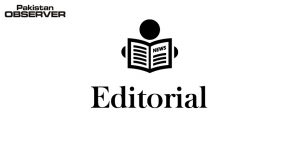Iqbal Khan
EVEN mainstream opposition leaders of India like Rahul Ghandi and Ghulam Nabi Azad have been deported from Srinagar and denied access to India-occupied Kashmir (IoK). This is the facade of the tyranny that reigns today’s IoK. Modi’s monstrous moves have set the Valley on fire and only a total lockdown is keeping real news blacked out. So only ruling party knows what all is going on in that unfortunate territory. Browbeating Kashmir to the status of political non-entity has been a longstanding bipartisan wish list of Indian political landscape in general; and more earnestly, it has been a well sought after Hindu-nationalist dream. Mainly because IoK is India’s only Muslim-majority state. “Kashmir is silent as a graveyard,” aptly said Vrinda Grover, a human rights lawyer, portraying immediate situation after 05 August. Now Kashmir has erupted like a volcano engulfing not only IoK but also sending powerful signals of their anger the world over, especially, Europe and America.
On 22 August, the United Nations Human Rights Office said it was “gravely concerned.’’ Jeffrey Gettleman et al wrote on 23 August for New York Times under the caption: “India’s Move in Kashmir: More than 2,000 rounded up with no recourse”. The piece narrated that: “Indian authorities say life is returning to normal in Kashmir. But thousands of people have been detained and the military still patrols the streets, firing pellet guns and tear gas to quell protests”. In “one of the biggest mass arrests of civilian leaders in decades carried out by India, at least 2,000 Kashmiris — including business leaders, human rights defenders, elected representatives, teachers and students as young as 14 — were rounded up by the central security forces in the days right before and after the Indian government unilaterally stripped away Kashmir’s autonomy”. Shamefully, Indian media has joined the Modi frenzy; “news channels routinely refer to detainees as “Pakistani terrorists’’ or “separatist leaders,’’ hence reinforcing Hindutva narrative.
Those arrested have been denied communication with families and contact with lawyers. Whereabouts of most of them stay unknown. Majority were rounded up around mid-night, which is illegal even by India’s draconian safety laws applicable only to IoK. India is bending its own legal system to cut off any possible criticism in Kashmir. India’s External Affairs Ministry does not like to explain why foreign media continues to be denied access to IoK, even when Home Ministry officials claim that situation is normalising. Indian boys in the boots are neither disclosing the charges nor how long the detainees will be held. Reportedly some have been airlifted by mysterious air force flights to India’s far away jails. Indian Home Ministry doesn’t entertain queries about the mass arrests.
Jeffrey added: “the mass roundup was the final piece of a detailed plan that Mr. Modi’s government set into motion last year. This included postponing state elections in Kashmir to create a gap in local leadership. Indian officials then changed India’s Constitution and moved to erase Kashmir’s autonomy and statehood without any input from Kashmiris”. Amnesty International (AI) has expressed concern at the ongoing communications blackout and noted that this may lead to possible human rights violations. IA also noted that the actions by the Indian Government denies the people of Jammu and Kashmir their key human right to freedom of expression. Likewise, the Committee to Protect Journalists (CPJ) has noted that “Severing all communications links is already an astounding violation of press freedom. Detaining journalists as Kashmir approaches nearly two weeks of this blackout is one more form of intimidation and obstruction of the media.” Moreover, Reporters without Borders (RSF) has also reported that independent news reporting from India-occupied Kashmir is almost non-existent and that the authorities in New Delhi are doing everything possible to ensure that only the government’s version is heard.
Pakistan Press Foundation (PPF), an independent non-governmental organization has expressed grave concern over the communications blackout in India-occupied Kashmir with arrest of journalists and by cutting off access to internet access, cable and television channels. In a letter addressed to India’s Prime Minister Narendra Modi, PPF Secretary General has highlighted the recent report of UN pointing out that the “blackout is a form of collective punishment of the citizens of Jammu and Kashmir, without even a pretext of a precipitating offence”. Since 1947, IoK has been plagued by India’s policy of State terrorism unleashed through tyranny of its law enforcing agencies powered by draconian laws, only specific to IoK, result has been perpetual unrest and a feeling of insecurity. Locals term IoK as an open prison. This notion is supported by the fact that IoK is the most densely militarized combat zone of the world. Modi’s rash action of 05 August has ignited the IoK, yet once again. Indian annexation and bifurcation of IoK has poured fuel over Kashmiri sentiment. Popular slogan is: “There is only one solution! Gun solution! Gun solution!”
Kashmir has been an aching point for India’s nationalist political mind-set that powers “Rise of the Extremist” in India. Though Pakistan is seeking a non-military solution, Modi is digging in, despite appeals for restraint by world leaders. The UN has taken cognizance of the situation and has held closed door consultations. India stands isolated. At this point and time, none amongst the permanent members of the UNSC is likely to veto a Chapter VII Resolution terming India’s 05 August action unlawful and asking India to declare it null and void ab-initio. Narendra Modi, as indeed Hindutva brigade, has grossly underestimated the resolve of Kashmiri people. India’s annexation and bifurcation of Kashmir has sent into motion a trail of events that would eventually lead to a solution. The UN tool box has a wide ranging options to choose from. Support from the UNSC has been quite encouraging. It’s now time for the international community to “Walk the Talk”.
—The writer is a freelance columnist based in Islamabad.









